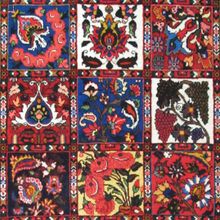Difference between revisions of "Lattice"
Jump to navigation
Jump to search
| (One intermediate revision by the same user not shown) | |||
| Line 21: | Line 21: | ||
|Common designs = | |Common designs = | ||
|Common motifs & patterns = | |Common motifs & patterns = | ||
| − | |Weave Area = | + | |Weave Area = [[Chaleshtor Rug|Chaleshtor]], [[Birjand Rug|Birjand]] |
|additional info = | |additional info = | ||
Latest revision as of 11:15, 21 July 2020
| Lattice | |
|---|---|
 Lattice Design (Rugman) | |
| General information | |
| Name | Lattice |
| Original name | قابی |
| Origin | |
| Weave Area | Chaleshtor, Birjand |
Lattice An all-over pattern consisting of ogives, diamonds, hexagons, octagons, or rectangles. Usually the cells are filled by some floral motif. In classic Persian rugs, lattices are ogives formed by curving stems or vines. These rug designs may be composed of a lattice in one plane or of two or three planes of lattices superimposed. The three-plane lattice design is most common. Early versions of these designs are curvilinear, while later versions consist of diamonds or hexagons rather than ogives.[1]
References
- ↑ Stone, 2013, 172
Bibliography
- Peter F. Stone. 2013. Oriental Rugs: An Illustrated Lexicon of Motifs, Materials, and Origins. North Clarendon: Tuttle.